Sorensen tours The Project in Moline

Democratic U.S. Rep. Eric Sorensen (IL-17) got his first tour of the new The Project of the Quad Cities home Monday afternoon.

The 38-year-old nonprofit moved last November from downtown Moline to 4101 John Deere Road, Moline, after being in two spaces and needed to consolidate in a bigger building with room to grow, CEO Caitlin Wells said.
“What’s really great about this new space is we have these two big conference rooms,” she told the first-term Congressman, pointing out rooms for training, board meetings, and gatherings for many support groups that use the space (typically every other week).
The spacious support group room is designed with a softer vibe, with comfortable leather couches.
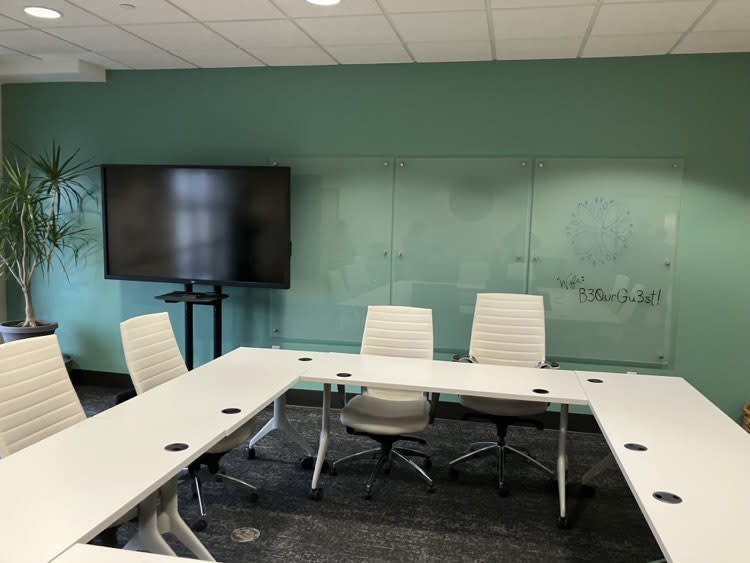
Sorensen of Moline, a former meteorologist, is the first openly LGBTQ person elected to federal office in Illinois. TPQC serves people living with HIV (the virus that causes AIDS) and the LGBTQ+ community, and Sorensen aimed to highlight work in Congress to support this community.
The Project now has expanded rooms for clinical services, including exam rooms and behavioral health – and they have three full-time mental health counselors, Wells said.
TPQC has its own pharmacy, which offers HIV treatment, STI prevention and treatment, and PrEP and PEP medications.
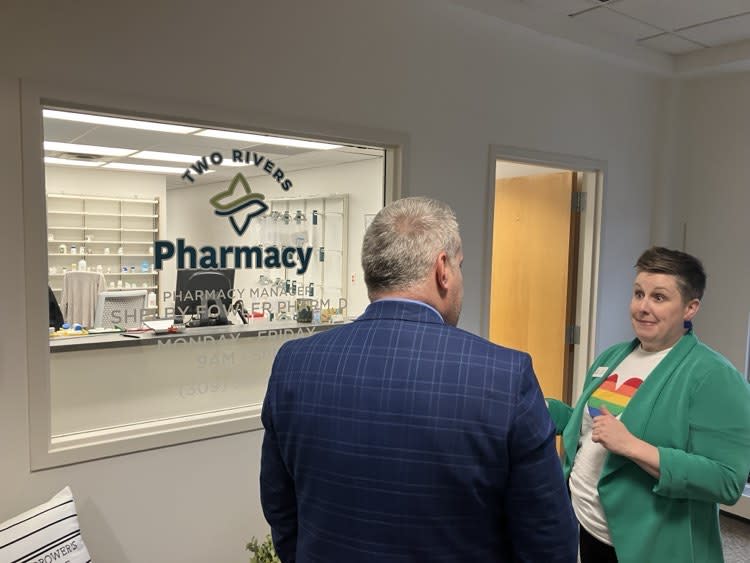
PrEP stands for pre-exposure prophylaxis. It is for people who don’t already have HIV but are at risk of getting it. PrEP is medicine that can reduce this risk. It can either be a pill that you take every day or an injection that you get every two months. With PrEP, if you do get exposed to HIV, the medicine can stop HIV from taking hold and spreading throughout your body.
PEP stands for post-exposure prophylaxis. PEP is for people who have possibly been exposed to HIV. It is only for emergency situations. PEP must be started within 72 hours after a possible exposure to HIV.
Sorensen asked if people can get prescriptions filled there, which is true. Wells said PEP can be hard to find in the area sometimes.
“Often pharmacies will send you home with a three-day script, so the course of treatment is usually 30 days,” she said. “It’s not a medication many pharmacies stock, so we’ve seen many folks who need PEP and can fill the rest of their prescription here.”

They have a new LGBTQ lending library, which has been a very popular hot spot, Wells said.
Growing the staff
Since 2019, The Project staff has grown from approximately 20 full-time staff members to about 40 full-time positions reflecting additional services including LGBTQ+ healthcare, harm reduction, PrEP & PEP to prevent HIV transmission, behavioral health, comprehensive STD/HIV testing, and care coordination & treatment for hepatitis C.
In fiscal year 2023 (April 1, 2022 – March 31, 2023), TPQC had close to 2,000 individual encounters in its sexual health clinic, and almost 3,000 encounters through the behavioral health program.
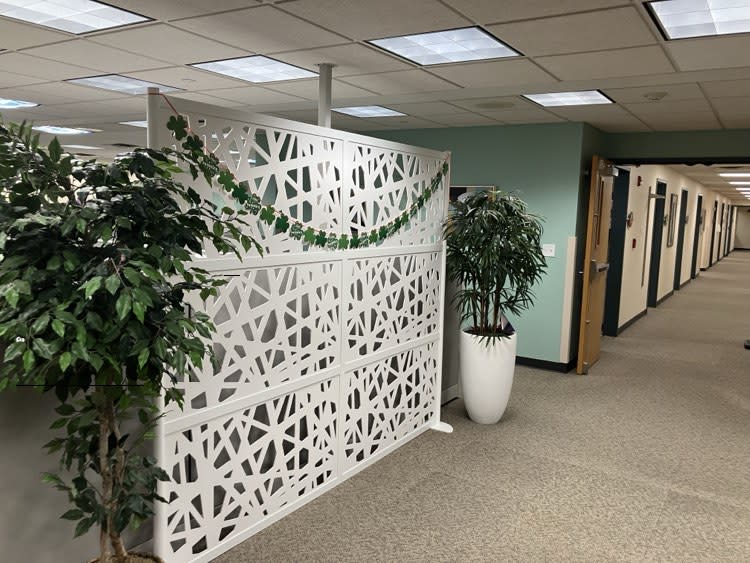
Two years prior, the group completed approximately 1,600 individual encounters in the clinic and 2,100 encounters in behavioral health.
Since Wells started in 2022, total staffing has been pretty even, but in the recent years prior, TPQC, only had about half of the employees it does now. Seven years ago, the budget was about $3 million.
“The growth in the office here allowed us all to be in one space, and we were really able to grow our behavioral health program and clinical exam rooms,” Wells said, noting they went from two to five exam rooms.

All TPQC services are free. They ask people who are insured if they can bill their insurance, she noted.
“That includes mental health and anyone who’s familiar with mental health services in the community, that’s an incredible thing,” Wells said.
A 2023 survey showed 66% of all LGBTQ youth say debates about state laws restricting the rights of transgender people have negatively impacted their mental health. A majority of trans and nonbinary youth seriously considered suicide in the past year and 1 in 5 attempted suicide, according to The Project.

The new building has a separate section for the clinical services, including exam rooms, and separate areas for other staff.
When Sorensen asked what the biggest service need for The Project is, Wells responded behavioral health and ensuring specific needs of the LGBTQ community are met.
“I think mental health continues to be one of the greatest needs that faces most of America, and particularly the LGBTQ community,” she said. “Recent legislation in neighboring states has made that even more relevant.”
Filling the Iowa gap
In January, The Project committed to providing gender-affirming care to Iowa minors, after Iowa Gov. Kim Reynolds signed a ban last year on such care in the state.
The Project inherited gender-affirming care patients from the University of Iowa LGBTQ Clinic. “They were servicing 200 to 250 individuals through that, and it was all going to shut down,” Andy Rowe, director of healthcare operations at The Project of the Quad Cities, has said. “There are places to get it like Minneapolis, Chicago. But all of those places are also full and have waiting lists.”
The care will come at a large cost to the organization, as the clinic had trouble finding medical malpractice insurance.
“There’s inherently opportunity, as states like Iowa make decisions that harm our community, we can step up to the plate and continue to support them, and also let them know they’re not alone,” Wells said Monday. “That’s so important to let the community know we’re still here with you, we’re around you and we’ll continue to offer services that you need, especially when they’re not offered somewhere else.”
Wells said HIV/AIDS doesn’t feel like a crisis now, as it did 40 years ago. The Project has served the QC area since 1986.

Sorensen formerly served on The Project board of directors, before running for Congress (elected in 2022).
“I’m cognizant of the fact we live in a very welcoming place,” he said of the Quad Cities. “Also it seems like we’re taking steps backward.”
Wells said The Project feels lucky because they’re out of Iowa’s limelight, and not in Illinois’s focus being outside Chicago.
“We definitely have stories of people in the community who are struggling to come out to their families, or who are feeling the stigma from their families,” she said. “They’re seeing the legislation come through and impacted, even if it’s just a threat.”
Even if crtain anti-LGBTQ bills aren’t passed, the rhetoric can still say “You aren’t welcome,” Wells said. “As an organization, we are able to function above a lot of things but that doesn’t mean our community members, our clients and patients aren’t directly impacted by that.”
Raising awareness, money
The Project has made a concerted effort in recent years to raise awareness about what the nonprofit does, including community education. “There’s a lot more recognition of who we are,” Wells said.
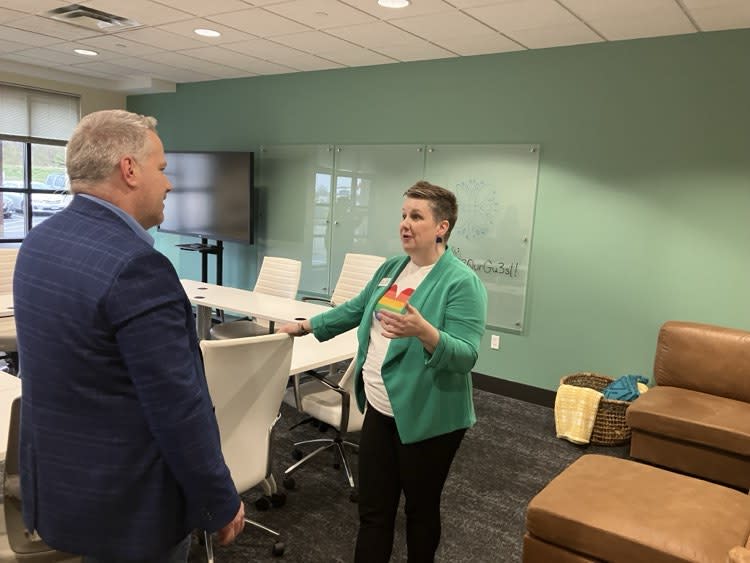
Of its $11 million annual budget, TPQC gets about one-third through federal grants (passed through the states), from the Ryan White Care Act, for HIV services, and CDC preventive services.
“The advocacy at the federal level has to maintain level funding at the bare minimum, and advocate for increases where appropriate,” Wells said. There were massive cuts proposed for people living with HIV, she noted.
“Especially for the Quad Cities – which isn’t a major metropolitan area or a major, there’s not a ton of people living with HIV – we’re the first ones to get the cuts,” she said. “We do have people living at risk with HIV right here.”
Wells implored Sorensen to advocate for such funding and be an HIV champion.

“Who’s the next generation of legislators, to step up and really advocate for HIV and I think, that’s not just HIV treatment. It’s national PrEP programs,” she said, adding it’s crucial to keep access to vital services.
The Project pharmacy is under 340B legislation, which requires federal support, Wells said.
Therapeutic support groups have grown (which helps when individual therapy has waiting lists). They include cognitive behavioral therapy (life skills), gender therapy for youth and adults, for trans feminine, and two Rainbow groups – serving LGBTQ folks who are using substances, said spokesman Tyler Mitchell.
TPQC’s behavioral health manager is very responsive to community needs and has added support groups as she sees those needs, Wells said. Another support group is for people living with HIV, and the only one in the region.
Avoiding crisis situations
Sorensen asked how to get more people connected to services before they reach a crisis.
“Destigmatizing mental health, which starts at the elementary school level,” Wells said. “It’s normalizing our mental health, like we normalize our physical health.”
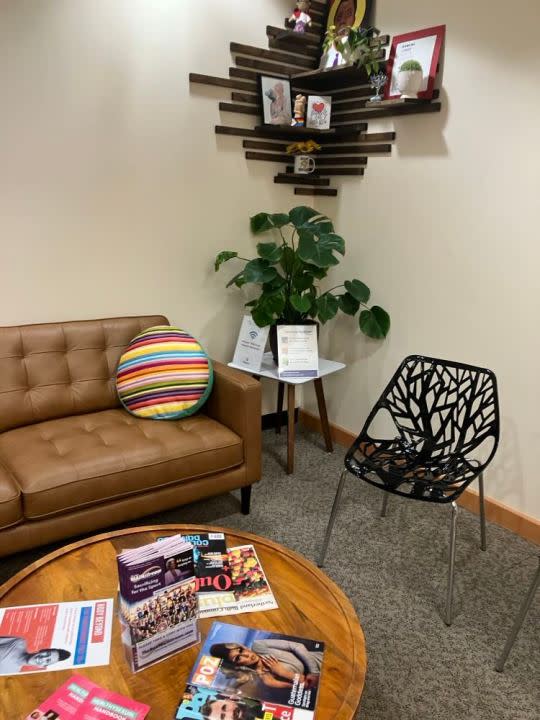
“We have to increase access to those services, meaning you need more mental health providers in the community, she said. “We’re continuously looking for more providers. There are wait lists almost everywhere you go.”
“We’re really happy to show him the growth in the new space, and continue to talk up the work that we do,” Wells said after the tour. “The importance of having him here is also to advocate for the HIV and LGBTQ community.”
“We really appreciate the opportunity to talk to him about those things, talk about what is important to us and bring that message back to Washington,” she said. Continued funding for HIV is still critical, she added.
Sorensen said he’s proud of TPQC for growing its space and services, to show the QC is a caring place, and people have that place to go before there is a crisis.
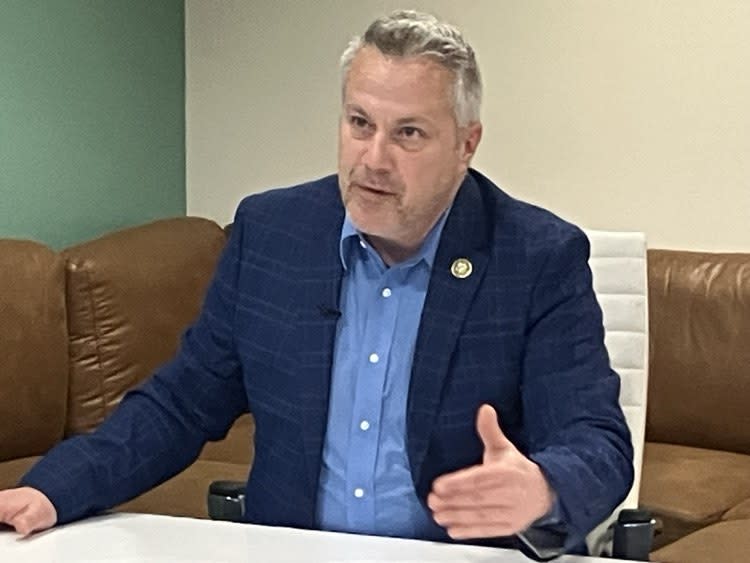
“That’s one of the most important things we need to do in our community, in our society and our country,” he said. “We can’t let it go all the way ‘til a crisis occurs. There has to be that point well ahead of time, there is somebody to connect to. There are solutions, you’re not alone. You can get through the toughest time in your life and The Project is a big part of that.”
Being a bi-state community, it’s a short drive to Iowa, where that state has taken back rights, which affect real people and real families.
“You can come across the border into the state of Illinois and get the health care that you need,” Sorensen said. “It’s frustrating when I see people play politics with health care in this way.”
He wants to appropriate funding for groups like TPQC, that meet the needs of people.

“In this political climate, there are so many folks that just want to cut funding everywhere,” Sorensen said. “When you cut the funding, you’re cutting a person out of a solution, and we’ve gotta make sure that doesn’t happen.”
For more information on TPC services, click HERE.
For the latest news, weather, sports, and streaming video, head to WHBF - OurQuadCities.com.

